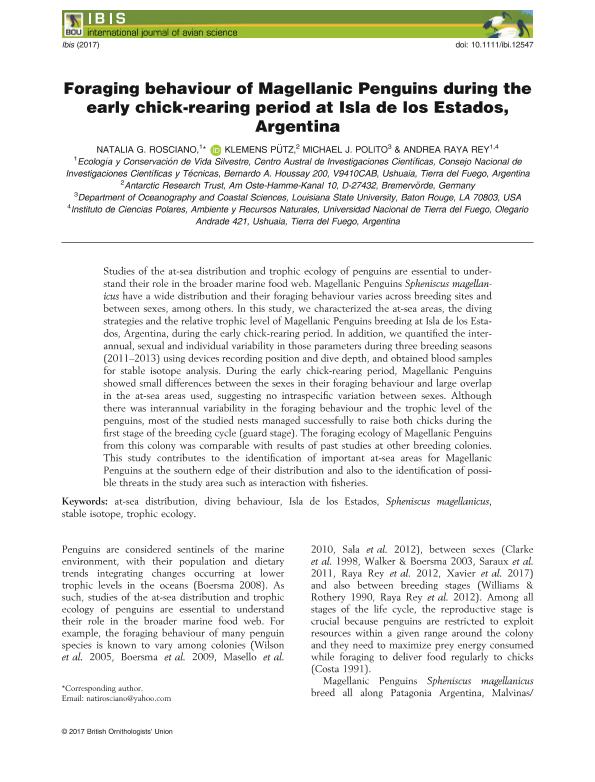Mostrar el registro sencillo del ítem
dc.contributor.author
Rosciano, Natalia Gimena

dc.contributor.author
Pütz, Klemens
dc.contributor.author
Polito, Michael J.
dc.contributor.author
Raya Rey, Andrea Nélida

dc.date.available
2018-11-02T14:01:55Z
dc.date.issued
2018-04-14
dc.identifier.citation
Rosciano, Natalia Gimena; Pütz, Klemens; Polito, Michael J.; Raya Rey, Andrea Nélida; Foraging behaviour of Magellanic Penguins during the early chick-rearing period at Isla de los Estados, Argentina; Wiley Blackwell Publishing, Inc; Ibis; 160; 2; 14-4-2018; 327-341
dc.identifier.issn
0019-1019
dc.identifier.uri
http://hdl.handle.net/11336/63505
dc.description.abstract
Studies of the at-sea distribution and trophic ecology of penguins are essential to understand their role in the broader marine food web. Magellanic Penguins Spheniscus magellanicus have a wide distribution and their foraging behaviour varies across breeding sites and between sexes, among others. In this study, we characterized the at-sea areas, the diving strategies and the relative trophic level of Magellanic Penguins breeding at Isla de los Estados, Argentina, during the early chick-rearing period. In addition, we quantified the interannual, sexual and individual variability in those parameters during three breeding seasons (2011–2013) using devices recording position and dive depth, and obtained blood samples for stable isotope analysis. During the early chick-rearing period, Magellanic Penguins showed small differences between the sexes in their foraging behaviour and large overlap in the at-sea areas used, suggesting no intraspecific variation between sexes. Although there was interannual variability in the foraging behaviour and the trophic level of the penguins, most of the studied nests managed successfully to raise both chicks during the first stage of the breeding cycle (guard stage). The foraging ecology of Magellanic Penguins from this colony was comparable with results of past studies at other breeding colonies. This study contributes to the identification of important at-sea areas for Magellanic Penguins at the southern edge of their distribution and also to the identification of possible threats in the study area such as interaction with fisheries.
dc.format
application/pdf
dc.language.iso
eng
dc.publisher
Wiley Blackwell Publishing, Inc

dc.rights
info:eu-repo/semantics/openAccess
dc.rights.uri
https://creativecommons.org/licenses/by-nc-sa/2.5/ar/
dc.subject
At-Sea Distribution
dc.subject
Diving Behaviour
dc.subject
Isla de Los Estados
dc.subject
Spheniscus Magellanicus
dc.subject
Stable Isotope
dc.subject
Trophic Ecology
dc.subject.classification
Otras Ciencias Biológicas

dc.subject.classification
Ciencias Biológicas

dc.subject.classification
CIENCIAS NATURALES Y EXACTAS

dc.title
Foraging behaviour of Magellanic Penguins during the early chick-rearing period at Isla de los Estados, Argentina
dc.type
info:eu-repo/semantics/article
dc.type
info:ar-repo/semantics/artículo
dc.type
info:eu-repo/semantics/publishedVersion
dc.date.updated
2018-10-19T15:06:25Z
dc.journal.volume
160
dc.journal.number
2
dc.journal.pagination
327-341
dc.journal.pais
Reino Unido

dc.journal.ciudad
Londres
dc.description.fil
Fil: Rosciano, Natalia Gimena. Consejo Nacional de Investigaciones Científicas y Técnicas. Centro Austral de Investigaciones Científicas; Argentina
dc.description.fil
Fil: Pütz, Klemens. Antarctic Research Trust; Alemania
dc.description.fil
Fil: Polito, Michael J.. State University of Louisiana; Estados Unidos
dc.description.fil
Fil: Raya Rey, Andrea Nélida. Consejo Nacional de Investigaciones Científicas y Técnicas. Centro Austral de Investigaciones Científicas; Argentina
dc.journal.title
Ibis

dc.relation.alternativeid
info:eu-repo/semantics/altIdentifier/url/http://doi.wiley.com/10.1111/ibi.12547
dc.relation.alternativeid
info:eu-repo/semantics/altIdentifier/doi/http://dx.doi.org/10.1111/ibi.12547
Archivos asociados
